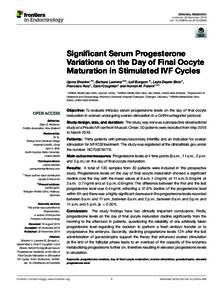وثيقة
Significant serum progesterone variations on the day of final oocyte maturation in stimulated IVF cycles.
المعرف
DOI: 10.3389/fendo.2019.00806
المصدر
Frontiers in Endocrinology. v. 10, 806
المساهمون
Lawrenz, Barbara., مؤلف
Bungum, Leif., مؤلف
Bixio, Leyla Depret., مؤلف
Ruiz, Francisco., مؤلف
Coughlan, Carol., مؤلف
Fatemi, Human M., مؤلف
الدولة
Switzerland
مكان النشر
Lausanne
الناشر
Frontiers Media S.A.
ميلادي
2019-11-20
اللغة
الأنجليزية
الملخص الإنجليزي
Objective: To evaluate intraday serum progesterone levels on the day of final oocyte maturation in women undergoing ovarian stimulation in a GnRH-antagonist protocol. Study design, size, and duration: The study was done as a prospective observational study at a Private IVF centre in Muscat, Oman. 30 patients were recruited from May 2018 to March 2019. Patients: Thirty patients with primary/secondary infertility and an indication for ovarian stimulation for IVF/ICSI treatment. The study was registered at the clinicaltrials.gov under the number: NCT03519776. Main outcome measures: Progesterone levels at 4 time points (8 a.m., 11 a.m., 2 p.m. and 5 p.m.) on the day of final oocyte maturation. Results: A total of 120 samples from 30 patients were included in this prospective study. Progesterone levels on the day of final oocyte maturation showed a significant decline over the day with the mean values at 8 a.m.:1.0 ng/ml, at 11 a.m.:0.8 ng/ml, at 2 a.m.: 0.7 ng/ml and at 5 p.m.:0.6 ng/ml. The difference between the first and the last progesterone level was 0.4 ng/ml, reflecting a 37.8% decline of the progesterone level within 9 h and there was a highly significant decrease in the progesterone levels recorded between 8 a.m. and 11 a.m., between 8 a.m. and 2 p.m., between 8 a.m. and 5 p.m. and 11 a.m. and 5 p.m. (p 0.001). Conclusion: The study findings have two clinically important conclusions: Firstly, progesterone levels on the day of final oocyte maturation decline significantly from the morning to the afternoon in patients, questioning the reliability of one arbitrarily taken progesterone level regarding the decision to perform a fresh embryo transfer or to cryopreserve the embryos. Secondly, declining progesterone levels 12 h after the last administration of gonadotropins support the theory that enhanced ovarian stimulation at the end of the follicular phase leads to an overload of the capacity of the enzymes metabolizing progesterone further on, therefore resulting in elevated progesterone levels in circulation.
ISSN
1664-2392
قالب العنصر
مقالات الدوريات

